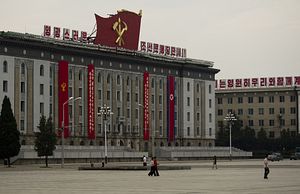The administration of Park Geun-hye took office in 2013 with the diplomatic objective of taking U.S. and China relations to a higher level. While the ROK-U.S. security relationship spanning over half a century continues to play its role in facilitating stability and deterrence on the Korean peninsula against the threat from the North, the PRC’s geopolitical significance, huge economic market, and particularly its perceived influence over the Kim Dynasty has made it a top diplomatic partner and priority for South Korea. For Park, this is a key stepping stone towards the national objective of ultimate Korean Unification, ending the legacy of Cold War confrontation, and establishing perpetual peace on the Korean Peninsula.
In fact, China is seen as holding the key to solving the North Korean problem. This is a belief widely shared in the West. And that in turn leads to the assumptions that U.S.-China relations, ROK-China relations, and China’s fear of North Korean collapse are the key variables in China’s North Korea policy.
These assumptions are not without evidence. First, the U.S. and China are the two most important actors in the material distribution of power, with the ability to shape the international system and coerce the weak. Second, enhanced ROK-China relations can encourage China to become an impartial player (according to international norms and practices) in its two-Korea policy, and perhaps one day even favor the South. Third, North Korean collapse and the subsequent flow of refugees could pose a grave danger to China’s domestic security, as well as the slight possibility of forward American troop deployment to its borders. The first two represent change, while the third points to continuity in China’s North Korea policy.
Yet, from a systems perspective, Northeast Asia and its constituent states form an organic system. And in a system, one actor’s actions can cause unintended systemic effects. The independent and dependent variable do not run in a linear causal fashion. Interaction effects are non-linear and variables are dependent on one another. For example, North Korea’s provocations and nuclear ambitions have been a major source of instability in the region and beyond. The ROK is faced with an imminent threat from the North and so uses most of its diplomatic resources to achieve peace on the Korean Peninsula. Also, America’s global policy of nuclear non-proliferation is seriously hampered by North Korea’s refusal to commit to talks. As a result, we are now talking about the possibility of establishing a U.S. missile defense system on South Korea.
This can be explained by realist theories of international relations, such as the security dilemma or offensive-defense theory. And in these theories, the relevant states are assumed to be rational actors seeking maximum security in a self-help system. Interestingly, North Korea’s despotic regime has survived for more than seventy years despite predictions of imminent collapse. One crucial factor has been China’s financial and political support for the North over the years.
Now, however, we are witnessing a possible transition in China’s North Korea policy. First, one unintended consequence of North Korea’s brinkmanship policy has been the discourse on the establishment of U.S. THAAD on South Korean soil. That has made China (not the ROK or the U.S.) the biggest stakeholder in North Korea’s nuclear tests. Indisputably, further nuclear ambitions by Kim Jong-un will create the required political atmosphere in Seoul and Washington for the deployment of U.S. high-tech military installations in South Korea. That will leave China with a weaker voice on THAAD deployments, with the most to lose from additional North Korean provocation.
Second, North Korean belligerence could pose a grave threat to China’s rise in world politics, a rise that requires a stable external environment for focused resource allocation. Whether or not China will become the potential challenger that the China Threat theory predicts, only the future knows. Even without those intentions, though, acquiring the requisite material capabilities of the challenger is a natural and reasonable course for China’s future actions. (A point also closely linked with the Communist Party legitimacy in an ever-plural global system). Hence, China, and not the ROK or the U.S., has the most to lose from North Korea’s hostile acts in the region.
In this regard (and with other factors such as territorial disputes in the equation), it can be argued that China is beginning to face an unfavorable political and strategic landscape. As a result, Beijing will be compelled to change its North Korea policy, whether it wants to or not. For this reason, China’s relations with the ROK and the U.S. are likely to improve, as the three parties will share a common interest in normalizing the North Korean state. Therefore, the time and conditions are right for the establishment of a new trilateral framework consisting of the U.S., China, and South Korea, an institutionalized framework that we have not witnessed in the past due to diverging views, interests, and objectives between constituents. With China as partner and with common strategic interests in play, the three key (if not only) actors capable of solving problems related to North Korea will have much more to offer as viable solutions.
Young-june Chung is a Ph.D Candidate in IR at China Foreign Affairs University.

































